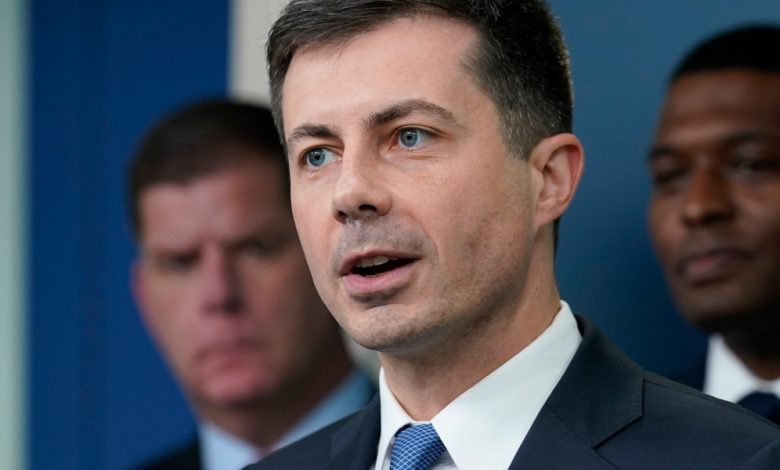Biden’s White House is urging senators to pass a deal to avert a rail strike

The US economy would suffer a severe economic shock if senators don’t pass legislation this week to avert a railroad workers’ strike. That’s the message the Biden administration is delivering in person to Democratic senators in a closed session Thursday.
The House of Representatives acted soon after a motion from President Joe Biden, passing legislation on Wednesday that would bind railroad companies and workers to a proposed deal reached in September but rejected by some of the 12 unions involved. But the Senate often works more slowly, and the timing of final votes is unclear.
Meanwhile, Labor Secretary Marty Walsh and Transportation Secretary Pete Buttigieg are meeting with Democratic senators Thursday to underscore that railroad companies will begin shutting down operations well before a possible December 9 strike.
“If there’s even a possibility of closure, railroads would have to start stopping their acceptance of things like hazardous material shipments that you can’t strand, about five days before that,” Buttigieg said in a CNBC interview.
“So my goal in speaking with the senators today will be to make sure they understand the implications of a shutdown or even approaching a shutdown,” he said. “It would not only collapse our rail system. It would really cripple our economy.”
Railroads say shutting down rail service would cause a $2 billion-a-day devastating damage to the economy. A freight rail strike would also have a large potential impact on passenger service, since Amtrak and many commuter railroads rely on railroad-owned tracks.
The railway companies and 12 unions have engaged in high-stakes negotiations. The Biden administration helped broker deals between the railroads and union leaders in September, but four of the unions turned down the deals. Eight others have agreed to five-year contracts and will get their workers’ wages back for the 24 percent pay rises that apply back to 2020.
On Monday, with a Dec. 9 strike looming, Biden urged Congress to enforce the tentative deal reached in September. Congress has the power, and has in the past legislated, to delay or ban railroad and airline strikes. But most lawmakers would prefer the parties to resolve their differences on their own.
Intervention has been particularly difficult for Democratic lawmakers, who traditionally align themselves with politically powerful labor unions, who have criticized Biden’s move to intervene in the treaty dispute and block a strike.
House Speaker Nancy Pelosi, D-Calif., responded to those concerns by holding a second vote on Wednesday on a bill that would add seven days of paid sick leave per year for railroad workers covered by the agreement. The demand for paid sick leave was a major sticking point in the talks, along with other quality of life concerns. The railroads say unions have agreed, after decades of negotiations, to forgo paid sick leave in favor of higher wages and strong short-term disability benefits.
Unions claim that with record profits, railroads can easily afford to add paid sick leave. Several of the major railroad companies involved in those contract negotiations reported earnings in excess of $1 billion in the third quarter.
Senate Majority Leader Chuck Schumer, DN.Y., said he understands the urgency and the economic stakes of a protracted struggle.
“Senators are working morning, noon and night to reach an agreement so that we can respond to this measure as quickly as possible,” Schumer said. “The Senate can’t leave until we get the job done. And Democrats will continue to work with Republicans to find a path forward that all can support.”
Schumer said a priority for him is to hold a vote on seven days of paid sick leave. But he needs to work out an agreement, as any senator can block a quick review of the rail measure.
The House of Representatives passed the Labor Agreement Implementation Act in September with broad bipartisan support. But a second measure, adding seven paid sick days for railroad workers, was largely aligned with party line and signaled a bleak outlook for that effort in the evenly divided Senate.
Our new weekly Impact Report newsletter will examine how ESG news and trends are shaping the roles and responsibilities of today’s leaders – and how best to address these challenges. Subscribe here.



